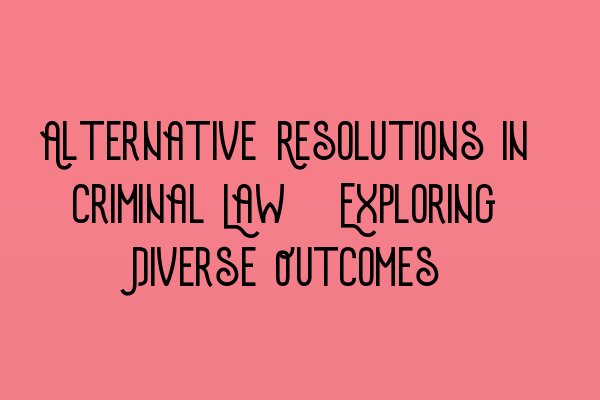Alternative Resolutions in Criminal Law: Exploring Diverse Outcomes
Welcome to the SQE Criminal Law & Practice Law UK blog! In this article, we will delve into the fascinating world of alternative resolutions in criminal law and explore the diverse outcomes they can offer. Criminal cases can often be complex and time-consuming, leading to an overburdened justice system. Alternative resolutions aim to address these challenges by providing alternative pathways to justice that are efficient and tailored to individual circumstances.
Before we dive deeper, let’s briefly explain what alternative resolutions are. Alternative resolutions are mechanisms that offer alternatives to traditional court proceedings. They provide a way to resolve criminal disputes outside a formal trial, by seeking mutually agreeable solutions between the parties involved. This approach is particularly useful for less serious offenses or cases where the available evidence might not be strong enough to secure a conviction.
Types of Alternative Resolutions:
1. Mediation: Mediation involves a trained mediator who facilitates a structured conversation between the accused and the victim. The mediator helps the parties to identify and discuss their interests, concerns, and needs. This process encourages open communication, empathy, and understanding, ultimately aiming to find a mutually acceptable outcome.
2. Restorative Justice: Restorative justice focuses on repairing the harm caused by the offense. It brings together the accused, the victim, and sometimes the wider community to address the impact of the crime. The process allows victims to express their feelings, and the offender to take responsibility for their actions, leading to potential amends and reintegration.
3. Diversion Programs: Diversion programs aim to divert individuals away from formal court proceedings, often by offering rehabilitative measures. These programs provide an opportunity for offenders to address the underlying issues that contributed to their criminal behavior. Completion of the program can lead to charges being dropped or reduced.
Benefits of Alternative Resolutions:
Now that we’ve explored the different types of alternative resolutions, let’s highlight their benefits:
– Efficiency: Alternative resolutions can save time and resources by avoiding lengthy court proceedings. This is particularly valuable for minor offenses, where formal trials may not be necessary.
– Flexibility: Alternative resolutions allow for more flexible outcomes tailored to the individual circumstances of the case. This promotes fairness and ensures that justice is served in the best possible way.
– Empowerment: Victims can actively participate in the resolution process, have their voices heard, and potentially receive restitution or apologies that can aid in their healing and closure.
– Rehabilitation: Diversion programs and restorative justice offer rehabilitative measures that can address the underlying causes of criminal behavior. This approach aims to reduce recidivism rates and promote social reintegration.
Effective implementation of alternative resolutions requires a skilled legal professional who understands the intricacies of these processes. At SQE Criminal Law & Practice Law UK, our solicitors are well-versed in alternative resolution methods and can guide clients through the complexities of these approaches.
If you’re preparing for the SQE exams, make sure to check out our related articles:
- SQE 1 Practice Exam Questions
- SQE 1 Practice Mocks FLK1 FLK2
- SQE 2 Preparation Courses
- SQE 1 Preparation Courses
- SRA SQE Exam Dates
So, whether you’re interested in alternative resolutions in criminal law or seeking guidance for the SQE exams, SQE Criminal Law & Practice Law UK is here to help. Contact us today to learn more about our services and expertise!
